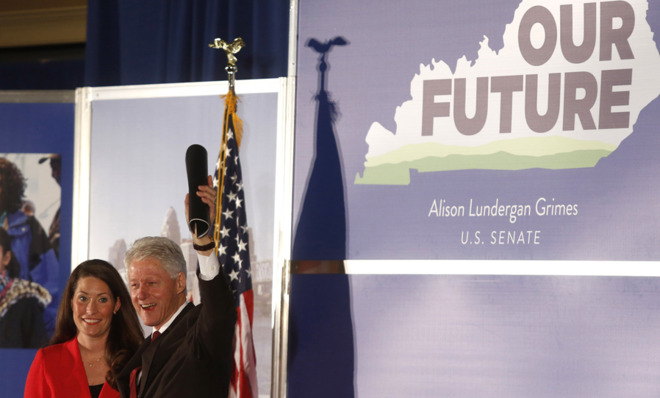Can Democrats still win in Kentucky?


Sam Youngman, a veteran political reporter for the Lexington Herald-Leader, joined us on Political Wire's podcast for a fascinating look at Kentucky politics, including the Bluegrass State's marquee U.S. Senate race and Sen. Rand Paul's political aspirations.
Here are five takeaways:
1. Kentucky has turned sharply to the right after picking Bill Clinton twice for president. Based on President Obama's approval numbers, you wouldn't know that the Bluegrass State voted for Bill Clinton twice. The state's politics have changed dramatically, and not to Obama's benefit. "I look at his approval numbers, which are just terrible," Youngman said. The state continues to boast strong Democratic representation in state government, exhibits A and B being Kentucky Gov. Steve Beshear (D) and Attorney General Jack Conway (D). But Republicans are hoping to poach the state House from Democrats for the first time since the 1920s. "We're still the only place in the South that has such a high Democratic registration, but I think it's deceiving," Youngman said. "We've moved further right over the last several years." The rightward swing may prove beneficial to Senate Minority Leader Mitch McConnell (R-Ky.) as he seeks re-election again.
The Week
Escape your echo chamber. Get the facts behind the news, plus analysis from multiple perspectives.

Sign up for The Week's Free Newsletters
From our morning news briefing to a weekly Good News Newsletter, get the best of The Week delivered directly to your inbox.
From our morning news briefing to a weekly Good News Newsletter, get the best of The Week delivered directly to your inbox.
2. Despite its growing conservatism, Kentucky has been a huge success story for the Affordable Care Act. Some observers wonder whether the governor should avoid tying himself to ObamaCare too much as Kentucky continues to get redder. Beshear has had other ideas, embracing the law to the fullest. Between the expansion of Medicaid and the state's insurance exchange, the state has enrolled nearly half its uninsured population in the first enrollment period alone. Still, ObamaCare remains unpopular in the Bluegrass State. "I laugh sometimes because it's just so strange — a Democratic governor in a red state pushing this program," Youngman said. "Signing up half of Kentucky's 640,000 uninsured in the first enrollment period is really pretty impressive. It's a far better measurement than what the federal program has done, but it continues to be a problem for federal Democrats."
3. The U.S. Senate campaign of Alison Lundergan Grimes (D) isn't going as smoothly as you think. Conventional wisdom holds that Grimes, Kentucky's secretary of state, will give the vulnerable, unpopular McConnell, the run of his life. But Grimes' campaign actually has serious problems, Youngman argued. Not only has Grimes not provided many details on key policy positions and been relatively cautious about her views on health care reform. Her campaign also seems almost fully devoted to bashing McConnell, a strategy that will only go so far against her already unpopular opponent. "'I've honestly been completely baffled by it," Youngman said. The negative campaign may be good for driving down an opponent's numbers, Youngman said, but she's leaving herself vulnerable to being defined by her opponents before she can define herself. "At some point, she's gotta start thinking about how she's going to sell herself as viable alternative for Kentucky," Youngman said.
4. Obama and ObamaCare may pose problems for Grimes. It's no secret that President Obama is unpopular in the Bluegrass State. Naturally, that raises the question of whether Grimes wants the president to campaign for her. That's probably not a good idea, Youngman said. He likened the president to a Duke University basketball player who sank the University of Kentucky's NCAA basketball title hopes in 1992 by hitting a game-winning shot. "I think Christian Laettner would be more welcome here than President Obama," Youngman said. The other elephant in the room is ObamaCare. Grimes has remained relatively quiet on the issue, towing the "fix it, don't repeal it" line that Alex Sink (D) used in her unsuccessful Florida special congressional election bid, Youngman said. Needless to say, Grimes faces a dilemma on the health care law: "Democrats say the program is working, Governor Beshear's numbers are in the positive area, but Kentuckians still don't like ObamaCare."
5. Can Sen. Rand Paul unite the various factions of the GOP in 2016? Maybe. On the one hand, Paul is strongly conservative on fiscal issues, in line with conservatives in the Republican Party. On the other hand, his libertarian stances on social issues like marijuana and same-sex marriage may boost his appeal among younger, more moderate Republicans. Could he potentially unite these factions in the GOP, perhaps even bridging the establishment-tea party divide? His biggest challenge remains winning over the GOP's hawks, such as Sens. John McCain (R-Ariz.) and Lindsey Graham (R-S.C.) and Rep. Peter King (R-N.Y.). "The hawkish wing of the Republican Party despises Rand Paul....They don't understand his rapid ascent, they think he's a fraud, and they're not shy of letting people know that," Youngman said. Should Paul decide to pursue the presidency in 2016, the other potential roadblock for Paul would be the Iowa caucuses. Social conservatives, though slowly diminishing in influence in the GOP, still hold major clout in this first-in-the-nation caucus state, and they may resist Paul's socially libertarian leanings.
A free daily email with the biggest news stories of the day – and the best features from TheWeek.com
Listen to the whole conversation here:
Subscribe via iTunes or RSS to get episodes automatically downloaded.
Taegan D. Goddard is the founder of Political Wire, one of the earliest and most influential political websites. He also runs Wonk Wire and the Political Dictionary. Goddard spent more than a decade as managing director and COO of a prominent investment firm in New York City. Previously, he was a policy adviser to a U.S. senator and governor. Goddard is also co-author of You Won — Now What? (Scribner, 1998), a political management book hailed by prominent journalists and politicians from both parties. Goddard's essays on politics and public policy have appeared in dozens of newspapers across the country, including The Washington Post, USA Today, Boston Globe, San Francisco Chronicle, Chicago Tribune, Philadelphia Inquirer, and Christian Science Monitor. Goddard earned degrees from Vassar College and Harvard University. He lives in New York with his wife and three sons.
-
 How the ‘British FBI’ will work
How the ‘British FBI’ will workThe Explainer New National Police Service to focus on fighting terrorism, fraud and organised crime, freeing up local forces to tackle everyday offences
-
 The best family hotels in Europe
The best family hotels in EuropeThe Week Recommends Top kid-friendly hotels with clubs, crèches and fun activities for children of all ages – and some downtime for the grown-ups
-
 Moon dust has earthly elements thanks to a magnetic bridge
Moon dust has earthly elements thanks to a magnetic bridgeUnder the radar The substances could help supply a lunar base
-
 The billionaires’ wealth tax: a catastrophe for California?
The billionaires’ wealth tax: a catastrophe for California?Talking Point Peter Thiel and Larry Page preparing to change state residency
-
 Bari Weiss’ ‘60 Minutes’ scandal is about more than one report
Bari Weiss’ ‘60 Minutes’ scandal is about more than one reportIN THE SPOTLIGHT By blocking an approved segment on a controversial prison holding US deportees in El Salvador, the editor-in-chief of CBS News has become the main story
-
 Has Zohran Mamdani shown the Democrats how to win again?
Has Zohran Mamdani shown the Democrats how to win again?Today’s Big Question New York City mayoral election touted as victory for left-wing populists but moderate centrist wins elsewhere present more complex path for Democratic Party
-
 Millions turn out for anti-Trump ‘No Kings’ rallies
Millions turn out for anti-Trump ‘No Kings’ ralliesSpeed Read An estimated 7 million people participated, 2 million more than at the first ‘No Kings’ protest in June
-
 Ghislaine Maxwell: angling for a Trump pardon
Ghislaine Maxwell: angling for a Trump pardonTalking Point Convicted sex trafficker's testimony could shed new light on president's links to Jeffrey Epstein
-
 The last words and final moments of 40 presidents
The last words and final moments of 40 presidentsThe Explainer Some are eloquent quotes worthy of the holders of the highest office in the nation, and others... aren't
-
 The JFK files: the truth at last?
The JFK files: the truth at last?In The Spotlight More than 64,000 previously classified documents relating the 1963 assassination of John F. Kennedy have been released by the Trump administration
-
 'Seriously, not literally': how should the world take Donald Trump?
'Seriously, not literally': how should the world take Donald Trump?Today's big question White House rhetoric and reality look likely to become increasingly blurred
